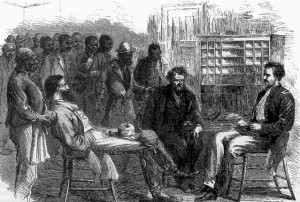(ThyBlackMan.com) In his book, Winning the Race: Beyond the Crisis in Black America , American linguist and political commentator John H. McWhorter writes: “When I hear someone say something along the lines of ‘why do we have to be talking about race? Why can’t we just be people and let that stuff alone’, I hear someone who hasn’t had the occasion to think hard about how the past effects the present.”
Today there is no better example of this avoidance of “race talk” than in the Republican Party where the very mention of race is viewed with suspicion.  Republicans, who hold such a view, tend to be what I call “Color-blind Republicans”. They feel that anyone who even mentions race is guilty of race baiting. This sort of accusation is leveled even if the issue of race is relevant to the topic at hand. ”Color-blind Republicans”, have only one weapon in their arsenal when debating any subject surrounding race – ignore it!
Republicans, who hold such a view, tend to be what I call “Color-blind Republicans”. They feel that anyone who even mentions race is guilty of race baiting. This sort of accusation is leveled even if the issue of race is relevant to the topic at hand. ”Color-blind Republicans”, have only one weapon in their arsenal when debating any subject surrounding race – ignore it!
Arguably, this approach puts our Party at a disadvantage when trying to engage new potential voters. By not factoring in ‘race’ and reaching out to ethnic media we fail to get our points of views out on a broad range of issues. And while most ”Color-blind Republicans”, see the avoidance of race talk as a good thing, the perception interpreted by many people is one of willful avoidance.
The prevalent “Color-blind theory”, hurts Republicans in our efforts to micro – target diverse communities in order to bring them into the fold. Not all Republicans are “Color-blind Republicans”, but the theory is very strong within conservative thought. One writer recently suggested to me that there were four categories of people in the party concerning views on race.
They include:
1. A true race baiter – people who just see life through the lens of race. If they get turned down for a position, it was due to race. Heck, if they get cuf-off in traffic, it’s because of race. Here’s the problem – when there is a legitimate instance of racial bias and these folks try to bring it to light, the temptation is to dismiss them since they’ve overplayed the “card” in the past.
2. The reasoned person – Will not inject race into a debate unless there is considerable evidence that racial bias is present. They evaluate the facts, and reach a conclusion.
3. Color-blind oriented – Is skeptical of anyone who injects race into the debate, often times because they prefer not to view their lives through a racial lens. Afterall, who wants to walk around feeling like they can’t reach great heights because of the color of their skin? They’ve made a personal decision to “do their own thing”.
4. The deniers – There is no racism, and if it exists, it’s very minute. Vigorous opposers of anyone who injects race into a debate and will often come up with stunning rationalizations to justify anything that even remotely suggests race could have played a factor. They often accuse anyone who brings up race as “race baiting”
What’s the point?
Don’t confuse those in the 3rd category with those in the 4th. There is a difference between someone who prefers to live their lives without being race-conscious (I suppose one could question how realistic this is) and someone who is a vigorous opponent of any race-based discussion. I think many black republicans fit in the 2nd and 3rd categories, there are a few in the 4th too. The Republican Party, by and large, appears to be somewhere between the 3rd and 4th categories.
The Republican Party was formed to battle the hate crimes perpetrated on the Black Community by Democrats. The entire debates surrounding slavery and post-war reconciliation were issues of race. The current topic is a bit ironic given that the Republican Party’s origins were directly related to the issue of race. John Charles Frémont, who was the first candidate of the Republican Party for the office of President, surely felt that race was appropriate to speak on when he become the first presidential candidate to ever include race in his platform.
Abraham Lincoln was clearly cognizant of race when during Reconstruction he implemented The Freedmen’s Bureau to help freed slaves in their transition to freedom. And let’s not forget that The Constitution was very much aware of race when on February 3, 1870, Republicans passed the first Civil Rights bill called the Fifteenth Amendment (Amendment XV) which prohibited any State from denying a citizen the right to vote based on “race, color, or previous condition of servitude” (i.e., slavery).
There is no assurance that Republicans will come to the same conclusions as Democrats about the cause and effect of any given scenario that involves race. As with anything there will be times where race is a huge factor and others where it will have no factor. But, by ignoring history and its overall impact on the events of the day, we Republicans lose the intellectual battle in promoting a better vision of assimilation for all Americans regardless of race.
The Republican Party in the past led the way in ensuring that blacks, who had been demoralized by the intuitions of slavery, became empowered citizens. There is no reason why the same Party, in today’s society, can’t reclaim that mantle again and lead a solution based movement “with race in mind” which helps to lead minorities out of poverty and into individual empowerment.
Staff Writer; Richard Ivory
For more thought provoking articles visit; HipHopRepublican.com.
Also connect with them via twitter; http://twitter.com/HHR

















Mr Ivory, it has never been about what party you are member of, therefore it has never been about “party,” it is and always will be about ideology. The racists were in the Democratic party during 1870’s because the Republicans favored legislation positive for Blacks. The racist in the 1960’s and 1970’s ( approximately 100 years later) switched from the Democratic Party back to the Republican Party. Why? The Democratic party under Lydon Johnson favored legislation positive for Blacks. I think there is a quotation in a great Book somewhere that says, “There is nothing new under the sun.” http://www.sslumpsum.com
Good article and very relevant.